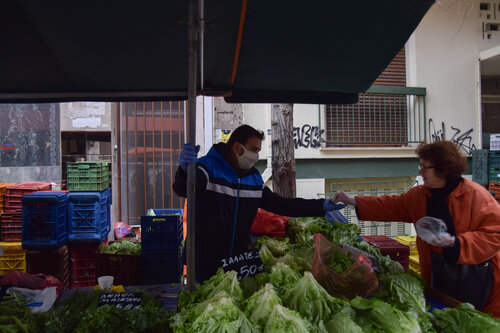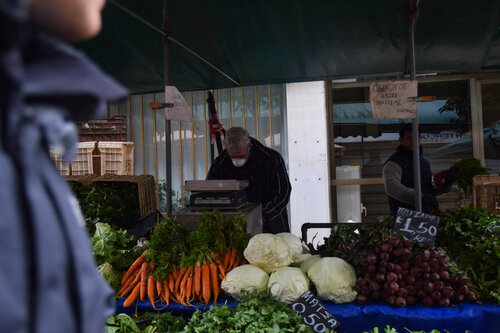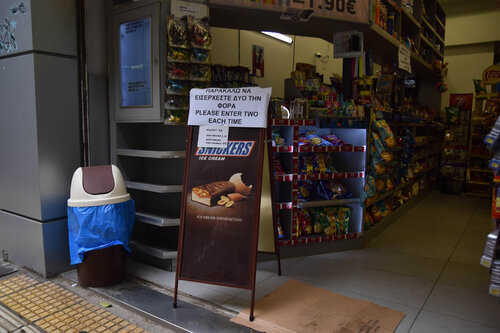
Pain Anger & Solidarity on the Front-line: What Italy Can Teach Us
As Italy battles a raging Coronavirus pandemic – which has already claimed over 6,000 lives – its experience has become a warning to the rest of the world: this is what happens when economic stability is put before human life. Now the virus looks set to bring fresh levels of suffering on people whose governments have ignored the warning signs. but in this new & painful reality, something else is happening. Workers are realising their power and fighting for the health and wellbeing of us all. This is what Italy can teach us.
Images by Veronika Merkova * see bottom
Vincenzo Cimini, 40, lives in Rome with his partner Francesca. The couple had been in Wales for almost 4 years but decided to return to Italy at the end of 2018 to be closer to family. Now, from their small house in Rome, Vincenzo and Francesca are in a state of lock-down.
“We’re okay so far,” he tells me when we chat just 10 days ago, shortly after the shutdown began. “Just locked inside the flat like the majority of the country.”
The quarantine there is stricter than what has just been announced in Britain. “We’re allowed to leave only for a reason,” says Vincenzo. “Like going into work or buying food. You need to bring with you an auto- declaration, stating where you are going and why. This will stay into force until the 3rd of April for now, but likely to be extended until after Easter…It is very, very weird.”
This is a feeling many people in Britain are now becoming accustomed to as well.

The UK government may be talking up its own containment measures, but it has been slow to act in some very basic ways and, even now, is allowing major businesses and construction firms to function as normal.
On the day Vincenzo is talking to me from a state in Quarantine, the Welsh Health Minister Vaughan Gething has just confirmed that the biggest rugby match of the year will still be going ahead in Cardiff a day later. His justification is that major events pose no real risk of fuelling the pandemic. In saying this, Gething is simply echoing the words of Boris Johnson, the British Prime Minister who said in a televised statement on the same day that: “banning such events will have little effect on the spread.”
“I did hear what Boris Johnson said,” Vincenzo tells me. “I think it’s total bullshit…From what we’ve seen so far in China and Italy, it might be a disaster for those countries not putting in place containment measures,”
His words sound particularly ominous for Britain.
The day before we speak, around 3,000 football fans from Madrid – a city already in partial lock-down due to the prevalence of the virus there- made their way to Anfield to watch their team play Liverpool in a Champions league knockout match. 2 weeks on, with the Spanish capital drowning in a medical emergency, the Mayor of Liverpool took to Twitter to say how the virus was spreading in his city.
As other sporting events across the continent were played behind closed doors, or cancelled entirely, UK government ministers were reportedly looking on in ‘grim bemusement’ at the idea of the public being banned from stadiums here. On the BBC’s flagship Today show, presenter Nick Robinson described the Cheltenham Races as “the festival that’s defying the gloom.” The event –estimated to be worth around £120milllion – went ahead as planned on 16th March, attracting some 250,000 punters. Now, many say they show Covid-19 symptoms.
Chiara Poletti is an Italian PHD student living in Cardiff. Her family are from Venice and the surrounding area. Recently she was unable to go back and visit because of the coutry-wide shutdown. Asked to describe the situation in her home country, she starts simply by saying it is “surreal and dramatic.”
“No one actually can believe how bad things have gone, so fast,” she tells me. “The majority of people I know are from outside the worst zones. But life has changed completely for everybody.”
Chiara says that every Italian she knows in the UK now is “living in a sort of schizophrenia.”
“We have news from our homes which seem like war bulletins,” she explains. “That scares you, and you just want to lock yourself in and stay at home.”
What’s made this more difficult, she says, has been witnessing how, up until this week at least, life in the UK “almost goes on like normal.”
About 10 days before we speak, Chiara talks to a friend of hers, Angelina, who is a doctor in the worst-affected Northern region.
I’m keen to know what the situation is like in Italy and how the health service is coping, but it’s telling that Angelina is more interested in using the platform to warn people in this country about what might be around the corner.
“She says that the situation in Italy is very bad,” Chiara explains as she relays the conversation. “Everyone should try avoiding crowded indoor places, even if the government does not impose any restriction.”
“If they close everything now, they might avoid to reach the mess they are having in Italy. She’s basically saying: start the lock down even without waiting for the government to tell you.”
Chiara kindly translates the rest of the conversation for me. It reads like someone setting off a fire alarm and telling people to get out whilst they still can.
“The situation here is really serious,” she says. “Hospitals with very good equipment and a lot of space in intensive care are at the limit, there is a shortage of people, beds and ventilators.”
“Between a quarter and a third of the sick who are hospitalised, young people also go to intensive care. The contagion resembles the Spanish Flu at the end of the First World War.”
“If the UK government doesn’t close everything, the tragedy will come there too.”

Angelina was speaking a full 8 days before the UK government closed schools, or even began to take serious measures around transport or large events to stop the virus spreading. In fact just days earlier, the British Prime Minister had joked on morning television that Britain could take the Coronavirus “on the chin.”
“I’d say they are buffoons, if there weren’t so many lives at risk,” Chiara says of the UK government. “But the situation is serious, and the government has lost all chances they had to intervene in time, considering the ridiculously small amount of resources given to the NHS.”
The situation in Italy remains extremely critical. Over a four day period from Saturday 21st March to Tuesday 24th March, a staggering 2,789 people died of Coronavirus, bringing the total dead to 6,820. Most worryingly of all for the UK is the fact that serious containment measures in Italy came into force at a much earlier stage of the outbreak compared with here, while the rate at which mortality is increasing is very similar between the two countries. As the Financial Times’ data guru John Burn-Murdoch tweeted on Saturday, the “UK already [has] more deaths than when China, Spain, France & others locked down.
Despite the shutdown in Italy, however, the spread of the virus in large parts of the North did not calm down as it had done in some of the smaller towns which had first been quarantined. Many pointed to the fact that while people were being ordered to stay in their homes, significant parts of the economy simply carried on. In other words, thousands of people were still being forced into work on trains and busses.
“It is believed that this is the major cause of the anomalous virus spreading in the Lombardy region, which is one of the productive areas of the country.” Vincenzo says when we speak a few days later.
“There has been a fight between the local governments and the national one, because nobody wanted to take action and shut down the factories, thus going against the industrial associations.”
In Britain, a similar situation has arisen following Boris Johnson’s statement on Monday night. As soon as the Prime Minister announced new Police powers to stop people gathering together and handing out fines, major companies deemed themselves ‘essential’ and ordered people into work.
“We stock a huge range of sports equipment designed for exercising at home,” said the business tycoon Mike Ashley as he confirmed that his Sports Direct chain would be defying the lock-down.
In Cardiff and elsewhere, construction workers building commercial units or luxury flats were made to turn up to work on Tuesday morning by their employer. Over the weekend, it emerged that Waterstones were not allowing their staff to wear protective equipment.
In spite of this, the Health Secretary Matt Hancock on Monday singled out ordinary people, not these business owners, as ‘selfish’ for spreading Coronavirus.
“You know there will be fines for people breaking the important rules?” said the former Labour MP Laura Pidcock on Twitter. “Will there also be fines for employers who are telling staff to come into work when they know it is not necessary?”
In Italy, a similar situation has sparked a furious backlash from workers, and may yet do here. On 12 March, workers from FIAT, Electrolux, Whirlpool, Amazon and others walked out in unofficial or ‘wildcat’ strikes under the slogan of ‘We are not lambs to the slaughter.’
The sudden wave of action forced the government to extend redundancy payments to workers. “[Redundancy pay] was already I place for medium and large companies,” Vincenzo says, “they’ve now extended it to small and micro enterprises too.”
“The struggle continues though, as a few large companies are still trying to force workers to take annual leave instead of shutting down production and go for the redundancy pay.”
And as in Britain, workers in the most precarious forms of employment such as self employed workers or those on zero hours contracts are not protected.
But just as significantly, the strikes helped bring about measures to stop the virus spreading.

Vincenzo tells me the strikes “forced the government to take actions. Now factories that cannot guarantee some safety measures, such as providing face masks and gloves have to close down.”
In achieving this result, workers were not only ensuring their own safety but the well-being of society as a whole. In other words, they were fighting for everybody.
But, says Vincenzo, “a lot of factories are refusing to shut down because, even though the government would pay salaries, they would lose their profit if they stop production.”
Chiara describes the Fiat strike as “‘Massive.” Asked to expand, she responds:
“It’s a huge factory and in different parts of Italy, they went on strike. But also other factories…the unions were all together… they said they were not cannon fodder.”
She jokes that “it’s a great time for unions.”
“It was the first time that all the major unions agreed to take action in a while,” she says.
This agreement was forced into being by the workers themselves, who took the initiative and bounced union leaders into backing them.
10 days after the strikes and with the threat of more to come, the Italian government ordered even more businesses to shut down. Chiara believes it was the continued spread of the virus just as much as the strikes that forced this shift. “But definitely,” she says, “when factory workers move, something changes.”
I check in with Vincenzo a few days after our initial conversation to see how things are going.
“The situation is critical,” he tells me “The health system is struggling to cope in the northern regions – the richest regions where there’s one of the best health systems in Europe. In central and southern regions – apart from the Rome area- the system is not prepared at all, after decades of cuts and spending reviews.”
“If the epidemic spreads massively there,” he says plainly. “It will be a disaster.”
His warning will sound familiar to anyone who has seen how Wales’ health and social care infrastructure has been decimated by a decade of austerity. Now doctors are warning that South East Wales, and Gwent in particular, is on course not only to be one of the worst affected areas in the whole of Britain, but may be heading to the same situation Lombardy is in.
And just like in the U.K, Vincenzo says that opportunities to halt the spread early on were missed.
“There have been several errors in handling the first cases, and delays in taking containment measures,” he explains. “Mainly opposed by those who value profit more than public health.”
It is this battle between the value of human life and the value of company profits that is defining how capitalist states respond to the Coronavirus pandemic.
On Monday 25 March, US President Donald Trump said that: “We can’t let the cure be worse than the problem,” as he sounded out the idea of ending the US economic shutdown even if it meant unleashing the virus into American society. Many business leaders and government figures across the world agree with his assessment, which is essentially that the life of the economic system is more important than the life of its inhabitants.
An economic depression would undoubtedly be devastating, but it is highly questionable whether or not it is the inevitable side effect of prioritising everyone’s health.
“There is still a third option,” says the Scottish Socialist David Jamieson in a recent article. “Contain the disease with the most aggressive regime of containment,… pressing all assets into the NHS, production of emergency equipment and supplies, maintaining the most vital necessities like care and food supply chains. Anything and everything would have to be taken into public ownership to meet that end.”
The horror of the current moment being experienced by those in Italy, Spain and Iran – with cities like London, New York and even Newport set to follow suit – is not just a health concern. It is also that state governments and the most powerful arms of business simply cannot accept that a fundamental change to their economic and political model is required. It looks to many across the world like our rulers would rather see scores of people die than set about dismantling the free market and replacing it with something radically different.
“The reality is that this is pure intentional negligence,” says Chiara. “If they had any type of professional accountability they should be on trial. The only accountability they care of is at the time of election. Hopefully people will consider all this the next time they vote.”
But already people are delivering their verdict on how the system is dealing with this crisis. In the UK, action by workers in the Baker’s Union forced the Wetherspoons pub chain to reverse its decision to not pay staff wages.
There has been a strike wave in Italy. And now in America – set to become the global epicentre of a pandemic playing out along class lines – there are reports of unofficial walkouts.
In this new world, where the value of shelf stackers, food pickers, delivery drivers, teachers and nurses has come so clearly into view, workers could find they have real power to shape its future. It may come down to a choice between that, or a society even more unequal and unforgiving than the one we have now.
* Due to issues of travel surrounding Coronavirus and budget, voice.wales was unable to take pictures of those interviewed or of Italy. Therefore, Veronika Merkova has taken pictures of the shutdown in central Athens to illustrate the article. Please consider leaving a donation below if you have appreciated this article. Thank you.






